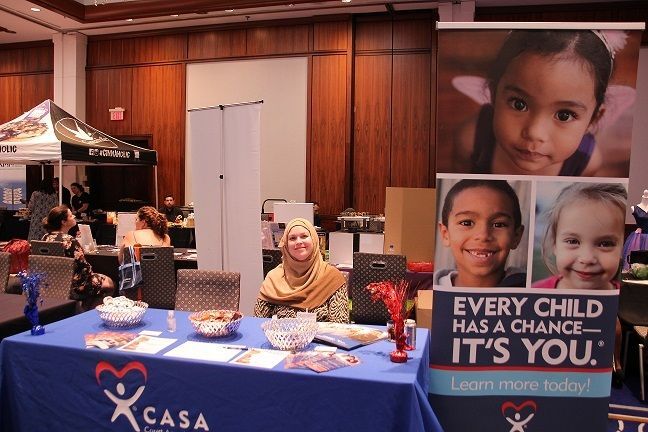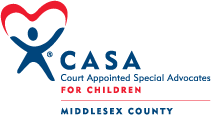-
What are CASA volunteers?
CASA volunteers act as the “eyes and ears” of the family court system, providing critical information to help judges make the best decisions for children who have been removed from their biological families due to abuse or neglect. An independent voice for each child, CASA volunteers also help to ensure that children receive the services and supports they need while in foster care to help them thrive and to move more quickly toward a safe, forever home.
-
What do CASA volunteers actually do?
Appointed by the court, CASA volunteers conduct an independent investigation of each child’s case to help judges make good decisions regarding the children’s well-being and safety while in foster care and ultimate placement in a safe, permanent home, whether that means returning to the biological family, adoption or some other option.
-
CASA volunteers:
- Spend time with the child,
- Communicate with people involved in the child’s life, including teachers, doctors, family members, caregivers and others involved in the child’s life,
- Review the child’s case files,
- Gather and document information,
- Identify and advocate for services for the child, such as therapy, family visitations, special education and other services,
- Make recommendations to the family court to ensure the best decisions are made on behalf of the child with regard to living arrangements, needed services, education and other critical factors in a child’s life,
- Receive support and guidance from CASA of Middlesex County throughout the life of a case.
-
Who is an ideal CASA?
An ideal CASA volunteer has a passion for justice, the ability to think clearly and critically and an interest in child welfare. You must be at least 21 years old and agree to background checks. Volunteers make a commitment to work with the children they are assigned for at least 18 months and preferably for the duration of the case. CASA volunteers come from all walks of life, with a variety of professional, educational, and ethnic backgrounds. There are more than 75,000 CASA volunteers nationally.
-
How do I become a CASA?
The first step is to complete an application, in which you will be asked to provide references. Once an application is received, we will contact you for an interview. You must pass a state and federal criminal background screening. Once approved, you will be provided with 30 hours of training and will be sworn in by a Family Court Judge prior to being assigned to a case. While the process is stringent, CASA volunteers take their responsibility to children seriously and understand that this process helps ensure that children receive the safety, help and support they deserve.
-
How does a CASA volunteer differ from a social service caseworker?
Social workers generally are employed by state governments and sometimes work on as many as 40 cases at a time. Social workers are also responsible for the interests of the entire family. By contrast, the CASA volunteer normally has one case and concentrates on the best interests of the child. The CASA volunteer is an independent appointee of the court and does not replace the social worker.
-
How does the role of a CASA volunteer differ from an attorney?
The CASA volunteer does not provide legal representation in the courtroom, which is the role of the attorney. A CASA volunteer does not represent the child’s wishes in court. Rather, the volunteer speaks to the best interests of the child.
-
How does the CASA volunteer relate to the child he or she represents?
CASA volunteers offer children advocacy and work to gain their trust. They visit each child at least once a month. In these visits they listen to the child’s opinion of where they would like to live permanently and what their hopes are for the future, while remaining objective observers. They may help encourage a child to cooperate with treatment, to expand their interests into positive activities, foster sibling visits, and be there to listen to a child that is often lonely.
-
Do lawyers, judges and caseworkers support CASA?
Family Court judges appoint CASA volunteers to cases. CASA has been endorsed by the American Bar Association, the National Council of Juvenile and Family Court Judges, and the Office of Juvenile Justice and Delinquency Prevention of the U.S. Department of Justice.
-
How many CASA programs are in the United States?
There are now nearly 1,000 programs in 49 states, Washington, DC, and the U.S. Virgin Islands.
-
How do CASA volunteers benefit children?
Children with a CASA are more likely to find a safe permanent home, when compared to children without a CASA. On average, children with a CASA spend less time in care, do better at school, get more services while in care and are less likely to live in multiple foster homes or return to care.
-
How much time does it require?
Each case is different in the number of hours per month. A CASA volunteer usually spends about 15 hours a month doing research and conducting interviews in the beginning of a case. After the initial period, volunteers spend anywhere from 5 to 15 hours a month, depending on the circumstances of each case.
-
How long does a CASA volunteer remain involved in a case?
Volunteers are asked to commit 18 months to the program. The volunteer continues until the case is permanently resolved. One of the primary benefits of the CASA program is that, unlike other court principals who often rotate cases, the CASA volunteer is a consistent figure and provides continuity for a child.
-
Are there any other agencies or groups that provide the same service?
CASA is the only program where volunteers are appointed by judges to represent the child’s best interests.
-
What is the role of the National CASA Association?
The National CASA Association is a non-profit organization that represents and serves the local CASA programs. It provides training, technical assistance, research, media and public awareness services to members.
-
How is CASA funded?
CASA of Middlesex County is a private not-for-profit agency that receives federal and state funding and support from private foundations, local fundraising activities, and generous donations from members of the community.
-
How can I contact my local CASA program?
CASA of Middlesex County would be pleased to meet you and tell you more about the program at one of our upcoming information sessions. Call (732) 246-4449 or contact info@casaofmiddlesexcounty.org for more information. If you are from another county, please inquire here to find the program nearest you: www.casaforchildrennj.org. The National CASA office can be contacted for help in finding a local program if you live in another state: www.casaforchildren.org.


